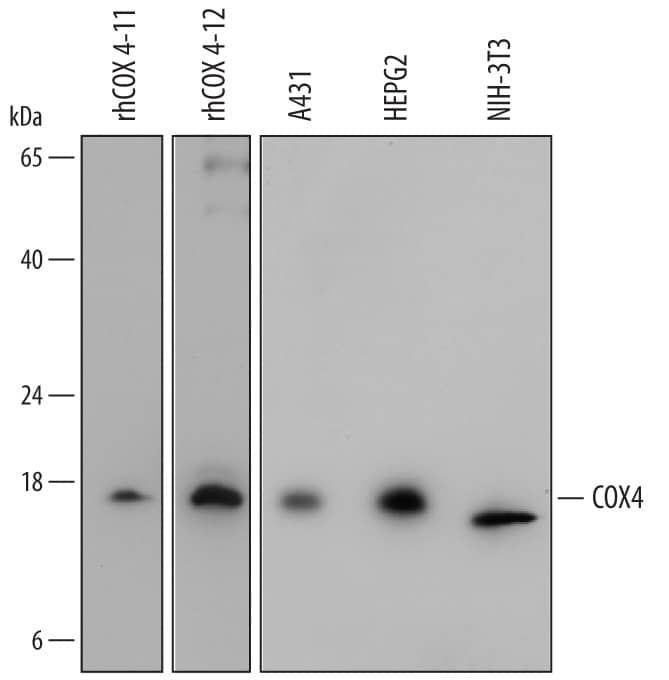COX4-I1 Products
Cytochrome c oxidase subunit 4 isoform 1 (COX4-I1) is a 21-22 kDa member of the cytochrome c oxidase IV family of proteins. It is a component of COX, an inner mitochondrial membrane multimeric dimer that catalyzes the transfer of electrons from cytochrome c to dioxygen. COX4-I1 is the largest of 10 distinct nuclear DNA-encoded subunits that form each COX monomer. Human COX4-I1 is 169 amino acids (aa) in length and possesses a mitochondrial transit peptide between aa 1-22, an ATP binding site (aa 42; 95-100), and multiple subunit interface sequences. The ATP binding site is suggested to make COX4-I1 a regulatory subunit within the COX complex. There are two potential splice variants for COX4-I1 that show a three aa substitution for aa 81-169, and a single Gly substitution for aa 125-169. COX4-I2, the product of a different gene, shares only 50% aa identity with COX4-I1. Over amino acid 23-169, human COX4-I1 shares 78% aa identity with mouse COX4-I1.
31 results for "COX4-I1" in Products
31 results for "COX4-I1" in Products
COX4-I1 Products
Cytochrome c oxidase subunit 4 isoform 1 (COX4-I1) is a 21-22 kDa member of the cytochrome c oxidase IV family of proteins. It is a component of COX, an inner mitochondrial membrane multimeric dimer that catalyzes the transfer of electrons from cytochrome c to dioxygen. COX4-I1 is the largest of 10 distinct nuclear DNA-encoded subunits that form each COX monomer. Human COX4-I1 is 169 amino acids (aa) in length and possesses a mitochondrial transit peptide between aa 1-22, an ATP binding site (aa 42; 95-100), and multiple subunit interface sequences. The ATP binding site is suggested to make COX4-I1 a regulatory subunit within the COX complex. There are two potential splice variants for COX4-I1 that show a three aa substitution for aa 81-169, and a single Gly substitution for aa 125-169. COX4-I2, the product of a different gene, shares only 50% aa identity with COX4-I1. Over amino acid 23-169, human COX4-I1 shares 78% aa identity with mouse COX4-I1.
| Reactivity: | Human, Mouse |
| Details: | Goat IgG Polyclonal |
| Applications: | WB, Simple Western, IHC, ICC |
| Reactivity: | Human, Mouse |
| Details: | Mouse IgG2b Monoclonal Clone #673803 |
| Applications: | WB, ICC |
| Applications: | ELISA |
| Reactivity: | Human |
| Details: | Rabbit IgG Polyclonal |
| Applications: | IHC |
| Reactivity: | Human |
| Details: | Rabbit IgG Polyclonal |
| Applications: | IHC |
| Reactivity: | Human |
| Details: | Rabbit IgG Polyclonal |
| Applications: | IHC, WB, ICC/IF |
| Reactivity: | Human |
| Details: | Rabbit IgG Polyclonal |
| Applications: | IHC |
| Reactivity: | Human |
| Details: | Rabbit IgG Polyclonal |
| Applications: | IHC |
| Reactivity: | Human |
| Details: | Rabbit IgG Polyclonal |
| Applications: | IHC, WB |
| Reactivity: | Human |
| Details: | Rabbit IgG Polyclonal |
| Applications: | IHC, WB |
| Reactivity: | Human |
| Details: | Rabbit IgG Polyclonal |
| Applications: | IHC, WB, ICC/IF |
| Reactivity: | Human |
| Details: | Rabbit IgG Polyclonal |
| Applications: | IHC, WB, ICC/IF |
| Reactivity: | Human |
| Details: | Rabbit IgG Polyclonal |
| Applications: | IHC, WB |
| Reactivity: | Human |
| Details: | Rabbit IgG Polyclonal |
| Applications: | IHC, WB |
| Reactivity: | Human |
| Details: | Rabbit IgG Polyclonal |
| Applications: | IHC, WB, ICC/IF |
| Reactivity: | Human |
| Details: | Rabbit IgG Polyclonal |
| Applications: | IHC, WB, ICC/IF |
| Reactivity: | Human |
| Details: | Rabbit IgG Polyclonal |
| Applications: | IHC |
| Reactivity: | Human |
| Details: | Rabbit IgG Polyclonal |
| Applications: | IHC |
| Reactivity: | Human |
| Details: | Rabbit IgG Polyclonal |
| Applications: | IHC |
| Reactivity: | Human |
| Details: | Rabbit IgG Polyclonal |
| Applications: | IHC, WB, ICC/IF |
| Reactivity: | Human |
| Details: | Rabbit IgG Polyclonal |
| Applications: | IHC, WB, ICC/IF |
| Reactivity: | Human |
| Details: | Rabbit IgG Polyclonal |
| Applications: | IHC, WB, ICC/IF |
| Reactivity: | Human |
| Details: | Rabbit IgG Polyclonal |
| Applications: | IHC, WB, ICC/IF |
| Reactivity: | Human |
| Details: | Rabbit IgG Polyclonal |
| Applications: | IHC, WB, ICC/IF |
| Reactivity: | Human |
| Details: | Rabbit IgG Polyclonal |
| Applications: | IHC |




